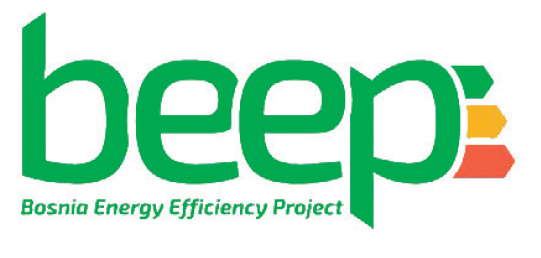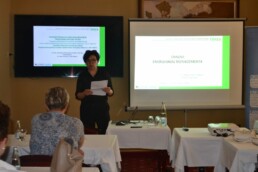ENERGY CERTIFICATION OF PUBLIC FACILITIES AND CONDUCT OF TRAINING WITHIN THE FRAMEWORK OF THE IMPLEMENTATION PROJECT OF MEASURES TO INCREASE ENERGY EFFICIENCY IN PUBLIC FACILITIES

"ENERGY CERTIFICATION OF PUBLIC FACILITIES AND CONDUCT OF TRAINING WITHIN THE FRAMEWORK OF THE IMPLEMENTATION
PROJECT OF MEASURES TO INCREASE ENERGY EFFICIENCY IN PUBLIC FACILITIES"
FEDERAL MINISTRY OF SPATIAL PLANNING
IMPLEMENTATION UNIT OF THE WORLD BANK PROJECT "ENERGY EFFICIENCY IN BIH ("BEEP")
Trainings were held for energy managers, representatives of cantons/municipalities and public facilities as part of the project "Energy certification of public facilities and training as part of the implementation project of improving energy efficiency in public facilities", on June 1 and 2 in Mostar, and on June 7 and June 8 in Sarajevo in 2022.
Bosnia and Herzegovina recognized the importance of energy efficiency (EE), so with the aim of realizing the economic sustainability of energy efficiency projects and the process of joining the European Union, it started financing the project "Energy Efficiency in Bosnia and Herzegovina" (BEEP) from loans from the World Bank, i.e. the International Development Association (IDA). This is the largest energy efficiency project in Bosnia and Herzegovina, for which the Federal Ministry of Spatial Planning, through the Implementation Unit of the BEEP project, responsible for the preparation, coordination, management and implementation of the project in the Federation of Bosnia and Herzegovina, hired consulting companies (CETEOR d.o.o. Sarajevo and ENOVA d.o.o. Sarajevo ) for the implementation of the project entitled "Energy certification of public buildings and training within the implementation project of improving energy efficiency in public buildings". The development goal of BEEP is to demonstrate the benefits of improving energy efficiency in public sector facilities and to support the development of adaptive financing models for energy efficiency.
Following the success of the project from previous years, BEEP continued its activities in 2022 at 37 public facilities located in Sarajevo, Zenica-Doboj, Tuzla, and Herzegovina-Neretva cantons, with the support of the legally prescribed guidelines from 2019 regarding the establishment energy management system at all levels of government in FBIH. The guidelines are prescribed by the Rulebook on the Information System of Energy Efficiency in BiH (Official Gazette of the Federation of BiH No. 2/19), the so-called ISEE adopted by the Federal Ministry of Energy, Mining and Industry (FMERI), whose purpose is to facilitate the user, i.e. energy manager of different degrees of responsibility, data collection, monitoring of energy and water consumption, and realized savings from implemented energy efficiency projects.
The project started its activities in 2016 and in each subsequent year it worked hard on the implementation of project components. The purpose of the facility's implementation was to reduce CO2 emissions, which means switching to cleaner energy sources, reducing air pollution in the winter period caused by the improper and inefficient burning of fuels that are currently in use, increasing the level of comfort in facilities, a positive impact on employment in the construction sector, increasing awareness of energy efficiency in the communities involved, and generally reducing local pollution. The benefits of EE are the result of the implementation of measures to increase energy efficiency in public buildings in FBIH (replacement of windows, installation of thermal facade, improvement of the heating system, lighting...); by increasing the capacity in the area, by providing training services for future energy managers, appointed persons in front of municipal and cantonal authorities, and representatives of public facilities that take care of the facility; activities of filling public building databases; and increasing the skills of target participants in the field of energy efficiency, renewable sources, energy management, relevant energy policies and norms and standards.
In the period from 2016-2020, a total of 55 public buildings were renovated, with a heated area of 166,913 m2. Thermal comfort in public facilities was improved for a total of 457,009 users; CO2 emissions were reduced by 4,564 t/year, and 1,325 green jobs were created. Total estimated energy savings amounted to 12,333,420 kWh/year with a total average investment in works of 25,088,140.12 KM. The average investment per object was 456,148.00 KM.
![]()
![]()
